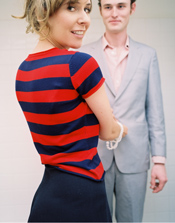
Eleni Mandell
Chris Catania
Six days into the new year singer-songwriter Eleni Mandell admitted her New Years eve entertainment choices of 2006 could have been better. But she quickly rebounded to tell me that the other 364 days of 2006 were much better and that she couldn’t wait to share her latest full length album Miracle of Five with fans and then get to touring and being with her audience.

We also talked about how she’s taken her already unique mix of pop, jazz, rock and country one step further create to songs that are more personally introspective. And as a result Mandell is reaping the benefits of being more comfortable with herself and where she’s headed as an artist.
During our afternoon phone conversation she explained how she’s turned the corner – leaving a lot of the angst in her wake – and matured while still staying true to her creative voice without compromising her talent or alienating her fans who’ve for the last five albums have fallen in love with her sultry noir take on love’s conundrums.
Miracle of Five definitely has the same intimate feel of the 1999 Jon Brion-produced debut Wishbone and 2004’s Afternoon but what exudes from almost every song on Five – beyond just the musical growth – is the sublime self-trust she has demonstrated in taking that emotionally progressive next step few artists ever take.
• •
So how were the holidays?
I made the mistake of going out to a hipster party on New Years. My boyfriend and I stayed in last year, ate chili and watched horror movies and that was the perfect New Years, and this year I thought, ‘How did I fall for this whole party thing again?’
Did he talk you into it?
No, not at all. I don’t know… somehow I talked myself into it. I thought, ‘Maybe it is good to go out on New Years.’
Yeah, the whole party thing does seem to get old after awhile doesn’t it? Staying in is definitely way too underrated.
Yes, it is. And actually in L.A. you really don’t want to be on the road with everyone drinking.
I don’t mean to get to personal or open any childhood scars of yours (or my own), but I have to say the moment I saw the album cover it reminded me of getting (or not getting) valentines dropped in the shoebox on my desk in grade school on Valentine’s Day…
[laughs] It was a stressful time back then wasn’t it? I didn’t have the cover in mind when I started the record. It was the first time I asked a friend who’s an artist in Paris if he had any ideas and I really like what he came up with.
What are you most excited about with Miracle of Five?
These some of the best songs that I’ve ever written. My voice sounds better than it ever has, working with Rob Schnapf (Elliot Smith, Beck) who mixed it, and Andy Kauklin who gave it that extra sparkle. It’s kind of old fashioned but modern sounding and timeless at the same time.
All your albums have a very intimate storytelling quality; Miracle has the same feel but it’s much more simple, stripped down and barebones, the sound and your writing.
When I write a song I don’t really try to intentionally tell a story. I’m just writing in an unconscious way. A lot of times I’m inspired by a title or one word. I do feel I’ve gotten good at snapshot stories and trying to say a lot with few words. There’s definitely an element of storytelling and real life experiences in all the songs and it’s great if people get that while listening.
What was it like recording with Nels Cline (Wilco) and DJ Bonebrake (X)?
Well, we weren’t all in the studio together and we recorded at different times. I’ve worked with DJ several times before. He’s such a joy to work and it’s a thrill to work with someone you’ve admired and grown up listening to, especially someone as nice as him. I’d never met Nels before but met him through my drummer Kevin Fitzgerald who played with Nels in the Geraldine Fibbers so I was really excited to have Nels bring his truckload of instruments. All the artists on the record are upstanding people and great musicians. I was very lucky to work with all of them.
You’ve mentioned before that you learn from your fellow musicians?
I learned the most from working with Andy Kaulkin. He was first a musician, so he approached the record both as an AR and a music lover and he helped me to see more of the sensibility of the album. I hadn’t made an album yet by thinking it as a whole piece. It was a new thing for me. Andy also brought my voice to the best it could be and he really pushed me more and helped me to see the benefit of taking time and really working on the songs to get them the best they could be and it really paid off.
Did that change the way you write? Will you take those kinds of approaches with you on future albums?
I’ll still write in the same way and it took a long time to make this record. But the way we recorded by first getting my vocals just right then moving on made it easier for me. I was calmer and more relaxed. That is something I want to do again. My previous albums were done all at once and I really enjoyed doing my parts first.
Did your love for music start when you got the Gibson guitar from your parents?
My love of music actually started before that. I grew up sitting around listening to records and staring at record covers in my bedroom, I’d listen and from there I began to want to sing and dance and make up songs.

Was there someone in your family that also loved music and encouraged you?
My mom thought it was important to learn an instrument. She played piano and wanted us to be well rounded and she believed it helped you learn math better. I first played violin and piano but I wasn’t really inspired by classical music; I wanted to play rock and roll. My dad was a big music fan and went to record store 3-4 times a week; he had a huge influence on me. Music was always important in our house. Playing or listening to it was a big part of our lives. When I got to be teenager, I wanted to be in a band so I guess it was a natural progression.
So did you have to convince your parents to get you the guitar?
Actually, I took the initiative and got lessons and then my dad said “…if you keep this up for a year then I’ll get you a guitar for your birthday. And that how I ended up with my Gibson.
On the title track “Miracle of Five” the lyrics seem to go back to the influence of your mom that you mentioned, when it came to math and music. It seems you had some fun with numbers on that one.
For the most part when I write it just kind of falls out of my head. I don’t spend a lot of time mulling over the lyrics. I do tweak them a bit and do some editing. With “Miracle of Five” I had a moment where I thought about when you’re holding hands with someone for the first time it’s such an incredible beautiful moment. It seems like a miracle, just a simple thing for a person with five fingers to connect with another person while holding hands and from there the idea grew. I thought that that’s where a lot of relationships start and since a lot of relationships are miracles I just followed the trail. It was really fun for me to work all the numbers in it and expounding on all the miracles that come from that one moment of having a crush and that person actually liking you back.
Was it intentional to have the album released near Valentines Day?
Well, you have to prepare so much when you’re going to release a record and with this one it took a long time and after it was finally completed it made that everything would be wrapping up and the album set to release in February. All the stars sort of aligned and we just went with it.
You’ve always drawn from personal relationships to write your songs. But this time around there seems to be a different perspective.
“Girls” and “Make Out King” are the two newest and two of my favorites. Those songs show that I’m on a different, more hopeful path of believing in myself more. Some one wrote that “Girls” was a stalker song and that’s not at all what it’s about. It’s actually about someone looking at a photograph and wondering who that person is, what kind of past they have, and how much they’re going to be able to love somebody because everybody come to the table with skeletons in their closet.
And then finishing the thought I had with “Girls,” “Make Out King” ends by saying that the “make out king has started to care…” It’s really just that I feel better about myself because I’m surrounded by better people and that I’ve learn to start to care. It may sound weird and it’s kind of hard to talk about lyrics because it sounds so cheesy. But I definitely feel confident about exploring the side of relationships where you care more about the person because you care more about yourself. And I’m doing it in a way that’s not cheesy but still real and true to me and honest with the listener and still consistent with how I’ve always written songs.

You’ve relied a lot on angst and heartache on your previous albums but not so much on Miracle of Five. It’s seems like you’ve turned a corner when it comes to your experiences in relationships.
Yeah, I have and the last song “Miss Me” is definitely the saddest song on the record, I wrote it three years ago. When I was going through a much more difficult time in my life and it set me up for the new stuff. Now I don’t feel like I have a lot angst and most people feel like writers lose those their talent when they lose their angst but I feel like I’m just getting started and I really excited about writing more songs and I’m thinking maybe losing the angst was a good thing.
Sometimes fans don’t go along with an artist when there’s been an emotional progression or maturity.
I’m not suddenly writing songs that are all happy and cherry but I’m also not writing songs that make it seems like everything’s great like I have all this money in the bank and now I’m going to sit by the pool. I don’t want to want to sound insane but I think that part growing older and maturing is that you realize that there are bigger things outside yourself and you kind of lose a lot of the self doubt that also fuels angst. So it’s not that I’m going to write such different songs or really cheerful pop songs now.
But I feel more comfortable with who I am and I feel I can stop self-obsessing and romanticizing negative relationships and look to the outside world more clearly and go beyond myself, look to the outside world and find more inspiration. And because that’s where I’m at now it doesn’t mean I’ve lost my edge. There’s more out there and that’s actually very exciting and it doesn’t mean that the good stuff is over as far as writing goes.
You mentioned earlier that you’re looking more to the world around you for inspiration. What’s inspiring you right now?
I’m really worried about the world and that’s been influencing my writing. When you stop focusing on yourself and look at the world around you things look different and become more apparent. I very concerned about the environment and the wars going on. I’m trying to remain hopeful about the future and I’m thinking a lot about the bigger questions in life and that’s been influencing my writing. It’s kind of hard for those kinds of questions not to because it’s starting to feel pretty scary and overwhelming.
Did those kinds of feelings filter into Miracle of Five?
In some parts it did, but not on the entire record. When I stopped focusing on just myself I found that the whole world opened up to me. I’m still the same Eleni but those types of thoughts and feelings have certainly changed things to where this record was a first step for me to go in a different direction. I always hope that traveling and playing music brings joy to people and that that helps to make the world a better place.
What role do you think music in general plays to influence the world? Can it really change the world as they say?
I think music is something that humans respond to the moment with born, how we’re drawn to music and rhythm and I often struggled with the fact that my music wasn’t helping people and I thought about becoming a nurse [chuckles] and I started realizing how important music really is and making it is what I’m really good at. I then realized how much music can affect people, how it takes us back to our childhood, colors our lives and helps us through hard times. And making music is, at the moment, what I can do for people and the connection you have with your audience is what really keeps you going.
What artists or music you help you to remember your favorite times in life and kept you going when life was hard?
[Sighs] Well, there’s just so many…I was making a mix-CD for a party I was having and included “Save it for Later” by the English Beat. I put that song and took me back to when I was thirteen, I can see the sun and all the feelings come rushing back, and my best friend would sing – this is going to sound funny but – [J. Geils Band’s] “Angel In A Centerfold” [laughs]. We’d sing it over and over in home room. And as I got older Tom Waits songs like “Small Change” reminded me of making out with my boyfriend in high school. I do hope that music is still important to people in a way that their lives are guided by the songs which are like road signs along the way.
Do you want your music to create memories like those for people?
If someone said that that they fell in love making out to one of my songs when they were in high school I would be thrilled!
So the mission would be complete then if a fan said that that happened?
[Laughs] I would say that the mission continues.
You mentioned that your awareness has changed and that you’ve been paying more attention the world around you. Was there any artist that you’ve been listening that helped you being to look outside yourself?
Some Bob Dylan stuff but a lot of political songs don’t usually sit right with me/ A recent Tom Waits song, “Day After Tomorrow” – it’s not my favorite song but the song talks about the dire state of the world and how it’s next to impossible not to be affected by chaos. Then there’s the song “The Road to Peace” on his new record Orphans. It’s a pretty heavy song, but it showed me how to pull off one the most difficult things as a songwriter which is to remind people about the ugly things in life without being heavy handed. That song is wonderful example of how to do that.
Do you ever feel that songs get misunderstood and how do you deal with that idea that music affects people in different ways?
Yes, that’s true and I know that people do experience music in different ways. It can be great or irritating when I hear what someone thought of or got from a song. But I don’t like it when someone hears a song I write and thinks that this character is stalking someone, especially not now, not at this point in my life. But you have to let it go and I can’t pay to much attention to that sort of thing. If I focused on those things I would go crazy. I might read a quote of mine in a interview that would send me in tailspin thinking about how poor my grammar is. I just try to let people experience the music the way they want to. You can please all the people all the time.
Do you read your interviews or reviews then?
I glance at them and but I don’t obsess over them. I stick to something Charles Bukowksi said: “You can’t believe the bad reviews and you can’t believe the good ones either.” I find that things work the best when I stay true to who I am and not worry about what people say or about the things I don’t have control over.












